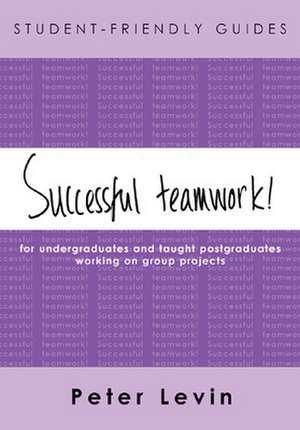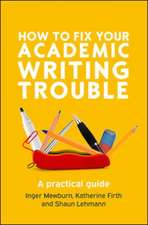Student-Friendly Guide: Successful Teamwork!
Autor Peter Levinen Limba Engleză Paperback – 16 sep 2004
· How to transform your group into a team
· How to take decision
· How to deal with‘free riders’
· How to work constructively with someone you don't like
· How to make good use of your experience when applying for jobs
A must for every student working on a group project, and especially recommended if you have been put into a group, assigned a project and left alone to get on with it!
Preț: 105.18 lei
Nou
Puncte Express: 158
Preț estimativ în valută:
20.13€ • 21.88$ • 16.92£
20.13€ • 21.88$ • 16.92£
Carte tipărită la comandă
Livrare economică 21 aprilie-05 mai
Preluare comenzi: 021 569.72.76
Specificații
ISBN-13: 9780335215782
ISBN-10: 0335215785
Pagini: 136
Ilustrații: illustrations
Dimensiuni: 149 x 210 x 7 mm
Greutate: 0.2 kg
Editura: McGraw Hill Education
Colecția Open University Press
Locul publicării:United Kingdom
ISBN-10: 0335215785
Pagini: 136
Ilustrații: illustrations
Dimensiuni: 149 x 210 x 7 mm
Greutate: 0.2 kg
Editura: McGraw Hill Education
Colecția Open University Press
Locul publicării:United Kingdom
Cuprins
Contents
Teamwork in universities. READ THIS FIRST!
Part One: Basics and context
What do we mean by ‘a team’?
The benefits of working in a team
Teamwork skills
Academic teamwork and the job market
Part Two: Getting started
Get in your groups
Get to know one another
Formulate your ground rules
The value of ground rules
Mission statements
Communication
Meetings
Taking decisions
Check out your assignment and plan your work
The project brief
The elements of project work
Programmes of work: the ‘critical path’
Allocating tasks
Part Three: How are we doing?
Progress on the project
Progress from ‘group’ to ‘team’
Personal progress
Part Four: Perspectives on team behaviour
Tensions: the task, the team and the individual
Team roles
Management systems and team organization
Team development: forming, storming, norming, performing …
The decision-making process
Negotiation
Cultural traits and differences
Individual traits: ‘cats’ and ‘dogs’
Part Five: Teamwork issues and solutions
The task: getting the work done
Getting help from your teachers
Sharing the work load: ‘social loafing’
The ‘free rider’ problem
Focusing on the task
Taking decisions: ‘risky shift’, ‘group polarization’ and ‘groupthink’
Personal and inter-personal issues
The group that doesn’t storm
Getting your multi-cultural group to ‘bond’
Do teams need leaders?
Dealing with a team member who tries to dominate
Working constructively with someone you don’t like
Finding your place in the team
Part Six: Benefiting from the experience
Getting feedback – including appreciation
Reflection
Learning logs
Reflective reports
Applying for jobs
Polishing up your CV
Being interviewed
Group tests in assessment centres
Notes and references
Further reading
Background and acknowledgments
Part One: Basics and context
What do we mean by ‘a team’?
The benefits of working in a team
Teamwork skills
Academic teamwork and the job market
Part Two: Getting started
Get in your groups
Get to know one another
Formulate your ground rules
The value of ground rules
Mission statements
Communication
Meetings
Taking decisions
Check out your assignment and plan your work
The project brief
The elements of project work
Programmes of work: the ‘critical path’
Allocating tasks
Part Three: How are we doing?
Progress on the project
Progress from ‘group’ to ‘team’
Personal progress
Part Four: Perspectives on team behaviour
Tensions: the task, the team and the individual
Team roles
Management systems and team organization
Team development: forming, storming, norming, performing …
The decision-making process
Negotiation
Cultural traits and differences
Individual traits: ‘cats’ and ‘dogs’
Part Five: Teamwork issues and solutions
The task: getting the work done
Getting help from your teachers
Sharing the work load: ‘social loafing’
The ‘free rider’ problem
Focusing on the task
Taking decisions: ‘risky shift’, ‘group polarization’ and ‘groupthink’
Personal and inter-personal issues
The group that doesn’t storm
Getting your multi-cultural group to ‘bond’
Do teams need leaders?
Dealing with a team member who tries to dominate
Working constructively with someone you don’t like
Finding your place in the team
Part Six: Benefiting from the experience
Getting feedback – including appreciation
Reflection
Learning logs
Reflective reports
Applying for jobs
Polishing up your CV
Being interviewed
Group tests in assessment centres
Notes and references
Further reading
Background and acknowledgments














